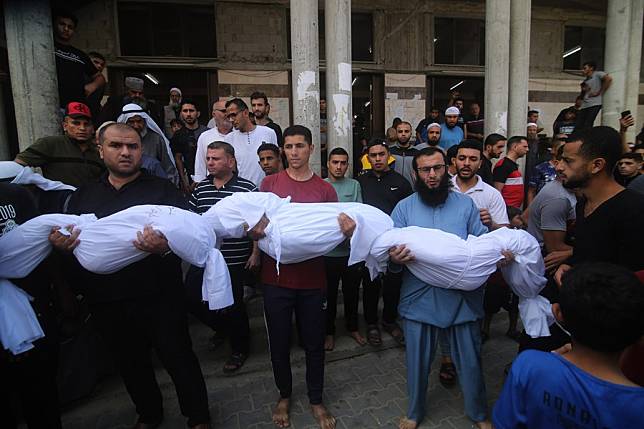Speaking against Israel’s Gaza evacuation orders, the Palestinian Health Ministry told the WHO that evacuating vulnerable hospital patients is dangerous. Patients who need life support or are gravely injured are vulnerable. Moving them during war risks their lives…
Due to airstrikes and restricted borders, civilians have nowhere to go during the Israel-Hamas war, therefore the WHO has called for a humanitarian corridor for secure assistance delivery.
Israel’s military ordered 1.1 million northern Gazans to evacuate immediately as it prepares to retaliate for Hamas’ October 7 terror attacks.
The WHO “joined the wider United Nations in appealing to Israel to immediately rescind orders for the evacuation of over 1 million people living north of Wadi Gaza,” it said Friday.
“Patients, health professionals, and any people stuck in a mass evacuation would suffer. Airstrikes and tight borders leave civilians vulnerable. Nearly half of Gazans are under 18. Lack of safe food, clean water, health services, and shelter puts children, adults, and the elderly at danger of disease “statement.
The Palestinian Ministry of Health told the WHO that evacuating vulnerable hospital patients is dangerous. Patients who need life support or are gravely injured are vulnerable. Moving them during war risks their lives.
The two operational Ministry of Health hospitals in northern Gaza are overcrowded and exceed their 760-bed capacity. Among the thousands of hospitalized patients, hundreds are critically injured and over 100 need critical care. The sickest of the sick. The statement said that thousands more with wounds or other health concerns cannot receive care.
Moving them is tough because to the short timeline, hard logistics, damaged roadways, and lack of supportive care.
Additionally, the four Ministry of Health hospitals in southern Gaza are full and lack the critical care capacity and supplies to treat more patients.
Lack of medical supplies endangers people and hinders doctors. WHO pre-positioned supplies in Gaza are mostly gone.
The statement said WHO Director-General Tedros Adhanom Ghebreyesus met with Egyptian President Abdel Fattah El-Sisi on October 9 and asked him to help transfer health and other humanitarian commodities to Gaza via the Rafah crossing.
Once the landing clearance is secured, WHO will send medical supplies to Areesh, Egypt, 20 minutes from Rafah, via its Dubai logistics base. More than 300,000 wound and illness sufferers could be treated using the supplies.
The statement added WHO requests a humanitarian corridor for safe delivery to Gazan health care institutions, including Rafah.
The statement added WHO continues to call for humanitarian access to life-saving supplies, fuel, water, and food; international humanitarian law protection for civilians, health workers, and health infrastructure; and an end to hostilities and violence.
Conclusion
The WHO has urged Israel to withdraw orders to evacuate nearly 1 million people north of Wadi Gaza due to airstrikes and blocked crossings. Critically injured or life-support-dependent hospital patients cannot be evacuated without risking their lives, according to the Palestinian Ministry of Health. The WHO and UN have urged Israel to revoke these instructions immediately. With hundreds badly injured and over 100 in critical condition, the two Ministry of Health hospitals in northern Gaza have exceeded their 760-bed capacity. The four Ministry of Health institutions in southern Gaza are full and lack critical care capacity and resources to treat more patients. On October 9, WHO Director-General Tedros Adhanom Ghebreyesus met with Egyptian President Abdel Fattah El-Sisi, who agreed to help WHO transfer health and other humanitarian supplies to Gaza via Rafah. The WHO requests a rapid humanitarian corridor for safe supply to Gazan hospitals, including via Rafah.



